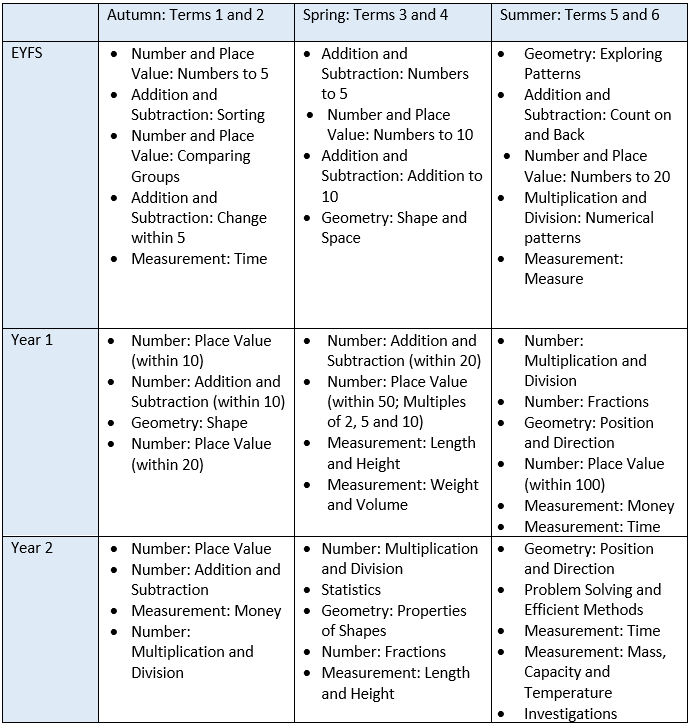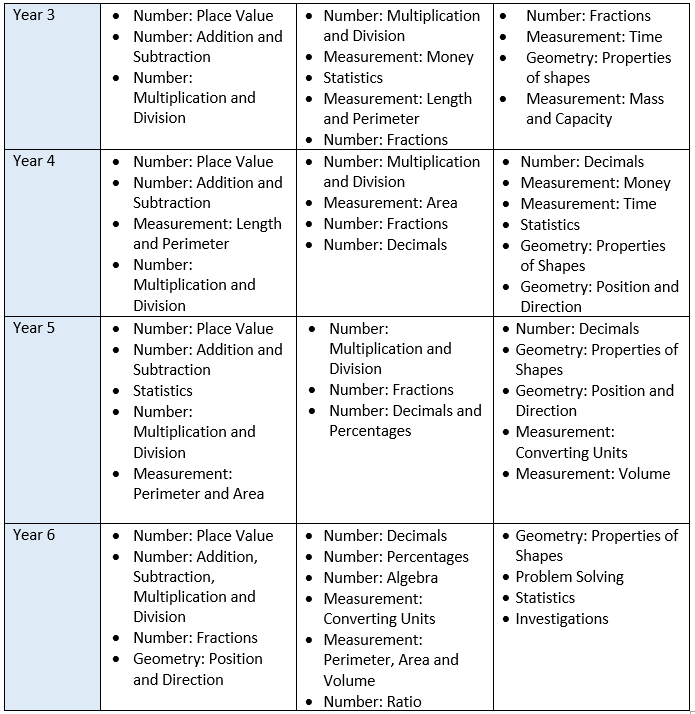Maths
Vision
The vision for our mathematics curriculum is to ensure children are taught to become competent mathematicians; we strive to embed the skills and processes necessary to enable children to use and apply their maths learning in a variety of contexts. We aim to develop children’s enjoyment of maths and provide opportunities for children to build a conceptual understanding of mathematics before applying their knowledge to everyday problems and challenges. We want our pupils to be able to apply their mathematical knowledge to other curriculum areas and understand that it is essential to everyday life, critical to science, technology and engineering, and necessary for financial literacy and most forms of employment. As our pupils progress, we intend for them to have an appreciation of the beauty and power of mathematics, and a sense of curiosity about the subject that will support them in their on-going maths journey.
Coverage
Our mathematics curriculum is implemented through daily maths lessons, consisting of an arithmetic session and main lesson.
The arithmetic sessions, referred to as CLIC, ensure children build and practise basic skills that can then be applied to all other areas of maths. CLIC sessions are constructed of four sections: Counting, Learn Its, It’s Nothing New and Calculation. During the Counting section, the counting objectives are covered for each year group, implemented via a range of means, including choral counting and writing out sequences of numbers. The teaching and practise of facts (such as number bonds, times tables, square numbers etc.) is undertaken in the Learn Its part of the session. It’s Nothing New is used to teach related facts to the Learn Its, or to revisit previous areas of maths learning. The final section, Calculation, enables children to practise the four operations, as set out in our calculation policy. These sessions ensure that our children gain fluency and confidence in mental maths and provides an important opportunity for constant revision and application of previously taught concepts.
As a school, we also use Times Tables Rock Stars – an online platform for practising times tables and their related division facts. Children are given individual login details and are expected to spend time practising as home as well as in school time.
Our main maths lessons follow the White Rose Maths Scheme of Learning, which has been developed to provide engaging lessons using the CPA approach – Concrete (manipulatives/objects), Pictorial (visual representations) and abstract (numbers and symbols). It is a highly effective approach to teaching that develops a sustainable understanding of mathematics in pupils.
Within the White Rose Maths Scheme, each National Curriculum objective is broken down into fluency, reasoning and problem solving; our teachers use the learning challenges to teach for mastery - an approach to extend and deepen the understanding of pupils within each year group. Our teaching staff use this document in conjunction with a range of high quality resources such as Classroom Secrets, I See Reasoning and NCETM to support, stretch and challenge all learners within the classroom.
The table below details the White Rose Scheme of Work for each year group:


Evidence
The evidence of the impact of our mathematics curriculum is monitored through assessments and discussions with senior leaders. Formative assessment takes place on a daily basis and teachers adjust planning accordingly to meet the needs of their class and ensure progression. Summative assessment takes place three times a year, using the White Rose assessment materials. Children in years 2 to 6 also complete end of block assessments to inform teachers of the knowledge and understanding acquired within each different area of maths learning. Each child’s progress and attainment is discussed with the maths coordinator, PPG lead and SENCO in regular pupil progress meetings. As well as analysing data outcomes, the teaching of mathematics is monitored through lesson observations, book scrutinies and discussions with pupils. These undertakings ensure that our maths curriculum is correctly implemented, resulting in successfully fulfilling our intent of ensuing children leave our school as competent mathematicians who are ready to embark on their secondary mathematics journey.
